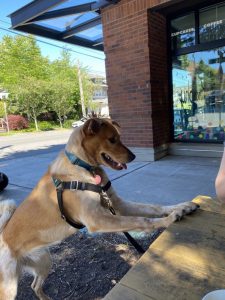People are asking me “Are you going to Belfast next year?” and “Are you going to Seattle?” and “Will you return to Germany?” and “Do we get to see you in person in Baltimore?” I always explain to European friends and North American friends that the airfares are large and more and more often they reply, “Well, it’s difficult for me, too.” And it is.
Yet the obstacles appear, to me, higher than they were.
I wondered if I was shouting about fire when it was merely a match that was burning. I know that my recent trip was difficult because I needed more physical help than I could afford. Several friends stepped up and made it happen, but there were too many times when I was nearly stranded with no recourse, simply because of the health issues. I still have nightmares about 5 moments that were well-nigh impossible.
For any future trip that takes more than 8 hours, I will need help at the other end and along the way. I have to accept that I cannot do things alone easily, even things that look perfectly straightforward to other people.
Shouting at me, “Get a scooter” when I’m struggling at a science fiction conference does not help, and (what happened a lot in Germany) someone walking by stopping to pick up my bag and get it over the hump or up the steps helps immensely. Neither of these are standard for any trip, but they’re what I experienced. Five times in one day in Glasgow I was told to get a scooter or a wheelchair, when, in fact, if I’d done that I’d have been unable to walk at all long term (or even a few days after).
This is not the first time that strangers and friends alike wanted to treat me in the way they thought chronically ill and disabled people should be treated and not consider (or even ask about) my actual circumstances. Because I can walk a little, most friends would say, “Come with me” and leave me at the other end with no thought that, since I had not planned to get to that place, I had no way of getting back in time for programme or for transport: I have to plan.
All this means is that I have to plan more when I travel. I need to be able to see what I can do and then achieve it.
I had to cancel visits to key sites in Germany because the world and my health simply did not permit it.
I had to cancel a half day at Glasgow because there were problems with a room for the panel I was on. All I needed to do to make everything work, was to sit. Not to sit and move and sit and move and sit and move – just to sit. Standing had fewer after-effects, so I stood and awaiting until the re-assigned room could be replaced with something else and the missing computer could also be replaced. All this happened, and was a miracle of reorganisation, but I had not sat when I had planned to. I could have done it on a panel or in a lounge chair, but intermittent movement with that particular pain meant that after that panel, I missed everything that didn’t take place in a single comfortable chair. I was not even able to walk back to the hotel and lie down. I was very lucky that afternoon because a friend stayed with me and we had a lovely evening and she got drinks and found mutual friends and… listened and paid attention to what I was saying about what I could do. She also made sure I got safely back to the hotel at the end of the evening, which was not a given because my direction sense fails when I am at that point of pain. Also, she did not treat me as a charity case, but as a delightful friend and who she was happy to spend time with. This friend resulted in there being no sour taste in my mouth from my incapacity. She’s wonderful. I did miss 8 hours of programming I had intended to enjoy, however.
All these are reasons for being careful how I travel, not avoiding long-distance travel entirely.However, I’ve now acquitted all the grants I was given to get to Europe. I took a moment to do some calculations after the last form went through.
In future, I don’t think I can get further than New Zealand without financial help. The recent trip cost the equivalent of 45% of my annual income. That was without adding enough assistance to make the trip at all comfortable, (which is what I was unable to do this time) and I’m still paying physically for the return journey. I could only pay that amount with help from the friends I stayed with and from the bodies that gave me grants, and, if I wanted an equivalent trip to anywhere in Europe or North America for a conference or for research without as many problems, it would cost me 60% of my annual income.
Without grants it’s just not possible. That’s easy to explain. What is not easy to explain is that many non-academic programmes and some academic programmes are pulled together at the last minute in these days of everyone working with too much pressure. If I’m not giving an academic paper or on programme, I cannot claim that amount on taxes. If I do not know about programme early enough, that adds $1,000-3,000 to the total cost of the trip because airlines play games with last minute travellers who need to arrange things carefully so that they don’t hurt for weeks. That brings the cost potentially to over 55% of my income if I go the route that hurts, and over 70% if I plan to hurt much less.
I will miss everyone, but I can’t travel long distances under these circumstances, however much I adore being with people and researching and discovering amazing things and listening to brilliant people. Also, the next person from Europe or North America who claims the same experience will be sympathised with, because over 45-70% of one’s income for one journey is quite scary.
If anyone has solutions and would like to see me in person, I would love to talk. In the interim, please just say “I’m sorry – I wish you could do these things” rather than telling me “I suffer just as much as you” while planning your next trip.


